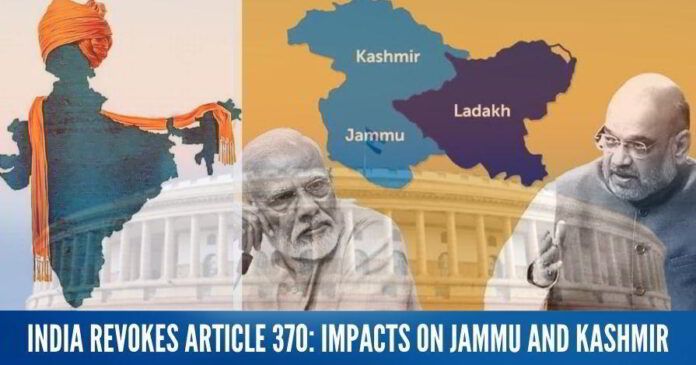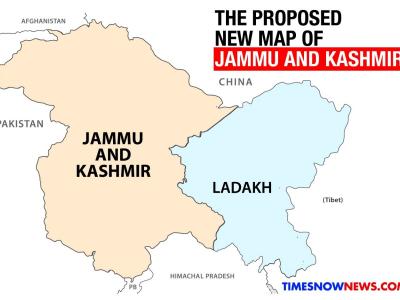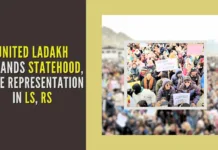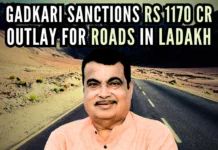
What is Article 370?
Article 370 granted and gave a special status and treatment to Jammu & Kashmir and its citizens, and a partial autonomy to the state. The partial autonomy included having its own constitution, a separate flag and the freedom to make laws. However, the foreign affairs, defence and communications remained the preserve of the central government.
History of Article 370
After the accession signed by King Hari Singh with Government of India, Kashmir became an integral part of India. But, Nehru, the then Prime Minister of India, took the issue to the UN when the Indian army was already in place in Jammu and Kashmir. King, Hari Singh didn’t ask for the plebiscite. Lord Mountbatten offered it to him for absolutely no reason. This was a sinister plan to keep a fire burning and that fire burned for seven long decades by killing thousands of innocents. Lord Mountbatten had no legal right to offer the right to decide to the people of Kashmir. The plebiscite was an extra-constitutional. If it was constitutional, every one of the 550 erstwhile states would have asked for freedom to decide their own path, which was not the case.
Two years after the state of Jammu and Kashmir had acceded to India, Article 370 was incorporated in the Constitution in 1949 that was opposed by several political leaders including congress ministers Dr Babasaheb Ambedkar, law minister and Sardar Vallabhai Patel, Home Minister. But, with Nehru’s blessings, it was signed between Hari Singh and Lord Mountbatten, the then Governor-General of India.
Preparations
Modi government has been meticulously planning for this historic move since last few years. In Feb 2019, the Jammu and Kashmir law was amended to incorporate SC/ST reservation. Additionally, as per the new amendment, the state governor who could exercise the powers of the elected government in absence of state assembly and an elected government in the state. By not referring to this, few journalists are confusing about the validity of the decision.
Days before India decided scrap article 370 that grants special status to Kashmir, the central government planned for an indefinite lockdown and massive troop deployment in the disputed region.
Minister of Home Affairs Amit Shah, popularly known as modern Chanakya, told parliament on Monday that the president had signed a decree abolishing Article 370 of the constitution, stripping the significant autonomy Kashmir had for seven decades.
 President signed the notification that revoked article 370 in Jammu and Kashmir
President signed the notification that revoked article 370 in Jammu and Kashmir
Major General GD Bakshi says, “The move-in J & K has been very proactive and preemptive. With the Americans wanting to get out of Afghanistan regardless of any costs and consequences for India, we need to anticipate Pakistan will certainly divert Afghan Taliban cadres for Kashmir. With that scenario in mind, this has been a very sensible and timely decision for which the Govt needs to be congratulated.”
 How Jammu and Kashmir, Ladakh will look? (picture courtesy: Times Now)
How Jammu and Kashmir, Ladakh will look? (picture courtesy: Times Now)
Impacts on People and India
1. Integration with India: The most controversial part of article 370 was article 35A that prevented non-permanent residents of J&K from permanently settling in the state. It also prevented non-permanent residents of J & K buying immovable property, acquiring land, applying for government jobs or any kind of scholarships, aids as well as other public welfare projects, which was exclusively reserved for Kashmiri people.
Now, Indians from other states can come and settle down in the valley without any restrictions.
2. Greater Freedom: The people of J&K will lose their permanent resident certificate and will become a general citizen of India. However, the Permanent Residents Law had many restrictions including barring a Kashmiri woman (and extended to her children) from any property rights if she marries a person from outside the state. This restriction was extended to her children to have any succession rights over the property. This will bring freedom to Kashmiri women.
3. One constitution: Jammu and Kashmir will no longer have a separate constitution but will have to abide by the Indian constitution much like any other state.
All Indian laws will be automatically applied to Kashmiris and the people from outside the state living in the region.
4. Increased Business Opportunities: Indian, as well as multinational business houses, can set up their businesses in the region by giving an equal job opportunity to an Indian from any part of India.
A new business can potentially boost the local businesses and increase the job opportunities in the region in the absence of 35A. Former Finance Minister, Mr Arun Jaitley mentioned in this blog that “No investor is willing to set up an industry, hotel, private educational institutions or private hospitals since he can neither buy land or property nor can his executives do so. Their ward cannot get government jobs or admission to colleges. Today, there are no major national or international chains which have set up a hotel in a tourism-centric State. This prevents enrichment, resource generation and job creation.”
The major boost can be expected in the area of real estate, tourism, textile and food processing.
5. Better security: After the demise of 370, the region will now be directly controlled by police and army, which will function under the central government of India, a similar to Delhi government that has limited power. By revoking Article 370 to create J & K, a new union territory will allow the Centre to declare emergency in the region except in case of a war. This is important, as the Union Government needed the concurrence of the state government to even declare a financial emergency in the state under Article 360.
A separate Union Territory for Jammu and Kashmir is being created that will function directly under the central government. Thus, the central government can have better control over the internal security situation in the region that was subject to cross border terrorism.
6. Change in legislative power: In future, J & K Assembly can not clear any bill on its own as it will require central government’s node to do so. In the absence of an elected government in the state, the state governor shall exercise the powers of the elected government. This was clause was introduced in Feb 2019 and the same was exercised to remove the article 370 yesterday.
7. Demographic change: This change will bring more cultural and religious diversity that could resonate with the rest of India.
Note:
1. The views expressed here are those of the author and do not necessarily represent or reflect the views of PGurus.
References:
[1] Modi government blunts Article 370, redraws Jammu and Kashmir map Aug 5 2019, India Today
[2] Govt proposes to reorganise state of Jammu and Kashmir: Here’s how J&K map could look like Aug 05, 2019, Times Now
[3] Article 370: What happened with Kashmir and why it matters Aug 06, 2019 BBC News
[4] The Rule of Law and the State of Jammu & Kashmir Mar 28, 2019 Mr Arun Jaitley’s Blog
- India revokes article 370: Impacts on Jammu and Kashmir - August 8, 2019
- Why I will support Prime Minister Mr Narendra Modi in 2019 - June 1, 2018











[…] the first between the Centre and mainstream Jammu and Kashmir politicians after the abrogation of Article 370 and the division of the erstwhile state into two union territories in August 2019. According to […]
[…] the people of the whole erstwhile State of Jammu, Kashmir and Ladakh under its own direct control[4]. It would also not be out of place to mention here that those who come to Jammu city for jobs in […]
Nehru made an open statement once that he doesn’t want Marwaris, Baniyas, Punjabis and others from India to buy land extensively in J&K which may alter the local demographic position and hence the Article 370 and 35A. He was hand in glove with Sheik Abdulla, then PM of state. Nehru went and submitted to UN for plebiscite on the advise of Edvina Mountbatten, without consulting his own cabinet. Nehru left such a legacy that Congress party workers even today believe some foreigner as head of their loosing every self respect just because she has Gandhi tag.
[…] post India revokes article 370: Impacts on Jammu and Kashmir appeared first on […]